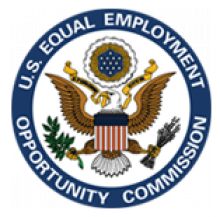TOP PRIORITIES FY 2024
In FY 2022, the Council of Inspectors General for Integrity and Efficiency (CIGIE) asked Offices of Inspector General (OIG) to identify three recommendations as their priority recommendations.

United States
In FY 2022, the Council of Inspectors General for Integrity and Efficiency (CIGIE) asked Offices of Inspector General (OIG) to identify three recommendations as their priority recommendations.
In accordance with the Accountability of Tax Dollars Act, we have audited the financial statements of the U.S. Equal Employment Opportunity Commission (EEOC). EEOC's financial statements comprise the consolidated balance sheets as of September 30, 2023, and 2022, and the related consolidated...
This report presents the results of our independent performance audit of the U.S. EqualEmployment Opportunity Commission’s (EEOC) information security program and practices inaccordance with the Federal Information Security Modernization Act of 2014 (FISMA). FISMArequires Federal agencies, including...
I am pleased to submit this Semiannual Report to Congress highlighting the activities of the EqualEmployment Opportunity Commission (EEOC), Office of Inspector General (OIG) for the sixmonths ending on March 31, 2024.
On March 11, 2024, the Office of Inspector General (OIG) received a request from your office to review nondisclosure policies, forms, agreements, and related documents specific to the U.S Equal Employment Opportunity Commission (EEOC or Agency) to ensure the anti-gag provision is included as...
OIG determined that two of the three challenges that impact the Agency ability to advance equal opportunity for all in the workplace. The challenges are customer service, data and technology transformation and modernization, and digital records management.
This Semiannual Report summarizes the Office of Inspector General's activities and accomplishments for April 1, 2023, to September 30, 2023. The Office of Inspector General issued one audit report, one evaluation report, and two other special project report. The Office of Inspector General received...
This Semiannual Report summarizes the OIG's activities and accomplishments for October 1, 2023, through March 31, 2023. The OIG issued three audits and two evaluations. The Office of Inspector General received 419 hotline contacts during the reporting period.